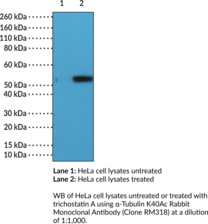Territorial Availability: Available through Bertin Technologies only in France
- Correlated keywords
- ?TAT K-40-Ac 40Ac HDAC-6 HDA-C6 RM-318
- Product Overview:
?-Tubulin is a cytoskeletal protein and constituent of microtubules, a cytoskeletal assembly that has roles in a variety of cellular processes, including cell motility, division, differentiation, and intracellular transport.{57121} ?-Tubulin is highly conserved in eukaryotes and expressed in a cell- and isotype-specific manner.{57122} There are eight human ?-tubulin isotypes that consist of an N-terminal domain, which binds GTP and is required for microtubule self-assembly, and a variable C-terminal tail, which contains interaction sites for microtubule-associated proteins (MAPs) and is subject to a variety of post-translational modifications that regulate microtubule function and stability.{57123,57124,57121,57125} ?-Tubulin can be acetylated at a variety of sites, including on the luminal side of microtubules at lysine 40 (K40Ac), by ?-tubulin N-acetyltransferase 1 (?-TAT) and deacetylated primarily by histone deacetylase 6 (HDAC6).{52895,52896} ?-Tubulin K40Ac is a marker of stable microtubules that recruits dynein and kinesin-1 to microtubules. It is also involved in regulating microtubule architecture as well as immune and viral responses.{52895,52897,52896} The levels of ?-tubulin acetylation are decreased in a variety of neurological disorders, increased in various cancers, and dysregulated in immune disorders.{52896} Cayman’s ?-Tubulin K40Ac Rabbit Monoclonal Antibody can be used for immunocytochemistry (ICC) and Western blot (WB) applications.
Cayman Chemical’s mission is to help make research possible by supplying scientists worldwide with the basic research tools necessary for advancing human and animal health. Our utmost commitment to healthcare researchers is to offer the highest quality products with an affordable pricing policy.
Our scientists are experts in the synthesis, purification, and characterization of biochemicals ranging from small drug-like heterocycles to complex biolipids, fatty acids, and many others. We are also highly skilled in all aspects of assay and antibody development, protein expression, crystallization, and structure determination.
Over the past thirty years, Cayman developed a deep knowledge base in lipid biochemistry, including research involving the arachidonic acid cascade, inositol phosphates, and cannabinoids. This knowledge enabled the production of reagents of exceptional quality for cancer, oxidative injury, epigenetics, neuroscience, inflammation, metabolism, and many additional lines of research.
Our organic and analytical chemists specialize in the rapid development of manufacturing processes and analytical methods to carry out clinical and commercial GMP-API production. Pre-clinical drug discovery efforts are currently underway in the areas of bone restoration and repair, muscular dystrophy, oncology, and inflammation. A separate group of Ph.D.-level scientists are dedicated to offering Hit-to-Lead Discovery and Profiling Services for epigenetic targets. Our knowledgeable chemists can be contracted to perform complete sample analysis for analytes measured by the majority of our assays. We also offer a wide range of analytical services using LC-MS/MS, HPLC, GC, and many other techniques.
Accreditations
ISO/IEC 17025:2005
ISO Guide 34:2009
Cayman is a leader in the field of emerging drugs of abuse, providing high-purity Schedule I-V Controlled Substances to federally-licensed laboratories and qualified academic research institutions for forensic analyses. We are certified by ACLASS Accreditation Services with dual accreditation to ISO/IEC 17025:2005 and ISO Guide 34:2009.

